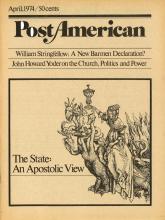Let every person be subject to the governing authorities. For there is no authority except from God, and those that exist have been instituted by God. Therefore whoever resists the authorities resists what God has appointed, and those who resist will incur judgment. For rulers are not a terror to good conduct, but to bad. Would you have no fear of the authority? Then do what is good, and you will receive its approval, for it is God's servant for your good. But if you do wrong, be afraid, for it does not bear the sword in vain; it is the servant of God to execute its wrath on the wrongdoer. Therefore one must be subject, not only to avoid God's wrath but also for the sake of conscience. For the same reason you also pay taxes, for the authorities are ministers of God, attending to this very thing. Pay all of them their dues, taxes to whom taxes are due, revenue to whom revenue is due, respect to whom respect is due, honor to whom honor is due. --Romans 13:1-7
Few passages of scripture have been as consistently misused and misunderstood as Romans 13. Such passages as this have forced Christians on both the right and left to wonder whether "biblical radicalism" is a contradiction of terms. Those on the right balk at talk of a discipleship that at times necessitates resistance to particular actions of a given state. They wonder whether such talk is being biblically irresponsible, because doesn't Paul plainly say, "Whoever resists the authorities resists what God has appointed, and those who resist will incur judgment?"
Read the Full Article

